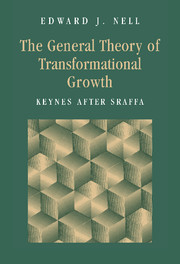Book contents
- Frontmatter
- Contents
- Preface
- Acknowledgments
- Part I History or equilibrium?
- Part II Method and approach: the active mind
- Part III Money and the Golden Rule
- PART IV The wage-profit trade-off
- Part V Investment and Mass Production
- Part VI Money and fluctuations in the modern economy
- Conclusions
- Bibliography
- Index
Conclusions
Published online by Cambridge University Press: 21 January 2010
- Frontmatter
- Contents
- Preface
- Acknowledgments
- Part I History or equilibrium?
- Part II Method and approach: the active mind
- Part III Money and the Golden Rule
- PART IV The wage-profit trade-off
- Part V Investment and Mass Production
- Part VI Money and fluctuations in the modern economy
- Conclusions
- Bibliography
- Index
Summary
This book began with a complaint and a vision. The complaint charged that much of what passes for modern economics is actually the theory of the working of markets in an earlier age, propped up and kept alive by infusions of rational choice, prescriptions masquerading as descriptions. The result is a set of models that fails to give us much insight into how our world actually works, presented in rancorous debates over issues far removed from practical concerns.
The vision put History in place of Equilibrium, and saw the development of markets as a succession of patterns of adjustment, generated by technological change, itself driven by incentives created by markets. Market adjustment creates problems; innovation solves them, but changes the character of costs, which, in turn, changes the way markets adjust. Markets work through money, and the forms of money change as markets change. Money and credit are inseparably linked; as money develops, so does credit, and with credit, financial markets. These markets interact with those for commodities and labor in varying ways. Our stylized economic history is a parade of forms, marching through time. In fact, of course, reality will always be a mixture – the new developments will crowd in before the old have departed the stage. Only in theory can we see the unadulterated systems.
- Type
- Chapter
- Information
- The General Theory of Transformational GrowthKeynes after Sraffa, pp. 715 - 716Publisher: Cambridge University PressPrint publication year: 1998



